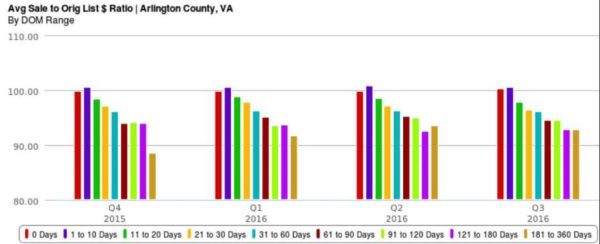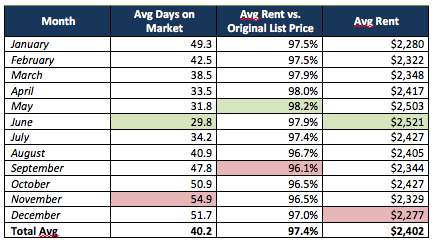This regularly-scheduled sponsored Q&A column is written by Eli Tucker, Arlington-based Realtor and Rosslyn resident. Please submit your questions to him via email for response in future columns. Enjoy!
Question: How do you think Trump’s presidency will impact real estate in Arlington/Northern Virginia?
Answer: I’ve never gotten so many questions about the same topic before (shocker…)! Like most of you, I entered election night completely unprepared for the result, so I’ve spent a lot of time getting read up on the impact Trump will have on our real estate market. The following is a summary of my findings sans my personal politics. Chicken Littles beware, I’m an optimist!
The Outlook Is Positive
Most of what I’ve read suggests that the Northern VA real estate market stands to benefit in the short and mid term from Trump, but the long term impact is where the concern lies. Key factors include:
- Increased Defense Spending: More jobs, more office space and more money for the major Defense employers in the area like DoD, Boeing, Lockheed Martin and Raytheon should increase demand for housing, particularly in the mid and upper markets.
- Tax Cuts: The assumed tax cuts should give a number of fringe buyers enough cash to cover a down payment sooner than they expected. I wonder if this will encourage developers to convert large multi-family buildings from rental apartments to condos.
- Deregulation: Expect major deregulation on banks (Dodd-Frank) and home building to make it easier and cheaper to build new homes, thereby increasing the housing supply, which, in Arlington, is less than half of what economists say it should be in a neutral market. I do expect we’ll see increased demand well before an increase in supply.
- Markets: After the election-night 5% tumble in futures, domestic markets have responded positively, signaling faith in the economic impact of Trump’s presidency. Strong markets tend to signal strong real estate growth.
Still Too Much Uncertainty
Ken Harney, Real Estate writer for the Washington Post, recently admitted, “It’s still too early to assess [the new reality of the real estate market].” Despite early optimism from many industries, a lot of it comes down to Trump’s design and implementation before we can determine the impact. Here are a few major questions:
- Foreign Policy: Trump’s foreign policy changes project to be the biggest destabilizing factor of his presidential agenda and poorly executed foreign policy could easily trump (pun intended) any domestic growth. It’s way too early to start guessing how his foreign policy will impact local real estate, but it’s not too early to start hoping he gets it right!
- Fannie/Freddie: One of the biggest questions facing the residential housing market is how Trump will handle Fannie Mae and Freddie Mac, makers of the mortgage industry. Trump has spoken about dissolving these institutions, but hasn’t said much about what would replace them. If he leads a major attack on Fannie and Freddie, look out for drastic changes in access to credit and mortgage rates, for better or worse.
- Interest Rates: It’s time for us to stop telling consumers where we think mortgage rates are going, especially now that there are so many questions about the economy and turnover on Fed’s Board of Governors. Lynn Fisher, VP of Research and Economics for the Mortgage Bankers Association said interest rates might rise from the current 3.6 percent to 5.4 percent by 2019, but she added, “We’ve been wrong continuously for the last couple of years.”
Remember Where You Live
Arlington (and DC Metro) real estate remains one of the most stable real estate investments during difficult economic climates. We faired well during the Great Recession and Business Week ranks us among the top places to live during a recession. Strong fundamentals including Federal Government/Contractor jobs and valuable infrastructure like the Metro and an industry-leading fiber optic network support the local housing market.
The best advice I can give (mostly stolen from Warren Buffet) is don’t try to time the market, bet on America in the long-term, and make real estate decisions based on the needs of you and your family, not the talking heads on CNBC. Oh, and if you decide to bury gold in your backyard, do it quietly, after midnight and during a New Moon.
Here are some good articles I’ve found that hit on a range of topics that impact the local and national real estate market:
How Trump’s Presidency Could Impact Real Estate
Impact on 15 industries including Real Estate, Defense, and Banking
N.Va. economy, housing market in flux as Trump readies for presidency
Positive Outlook On D.C. Office Market
How President Trump Will Change the U.S. Housing Market
If you’d like a question answered in my weekly column, please send an email to [email protected]. To read any of my older posts, visit the blog section of my website at http://www.RealtyDCMetro.com.
Eli Tucker is a licensed Realtor in Virginia, Washington DC, and Maryland with Real Living At Home, 2420 Wilson Blvd #101 Arlington, VA 22201, (202) 518-8781.






